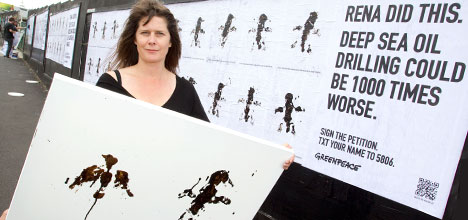The little blue penguins killed by the Rena's oil spill are being politicised in a deep sea oil protest.
Appearing along Auckland's Khyber Pass Road today are 150 original art prints of a penguin killed by Rena's oil.
They are accompanied by the message: ‘Rena did this. Deep sea oil drilling could be a thousand times worse.'
Greenpeace campaigner Louise Edge with the oiled bird portraits.
'This memorial to the 2,000 birds killed by the Rena disaster is also a stark reminder of the dangers of opening up New Zealand waters to deep sea oil drilling.” says Greenpeace campaigner Steve Abel.
The little blue penguin starring in the display was found dead and covered in oil on Matakana Island by Greenpeace volunteers.
The volunteers were helping the local iwi, Nga Hapu o te Moutere o Matakana, clean oil off their beaches following the October Rena spill.
A diving petrel was also found. In total, more than 2000 birds have died from the Rena oil disaster.
Auckland artists and Greenpeace volunteers came up with the concept of making ‘oil prints' with the birds and donated their time to create them.
The original ‘oil on canvas' prints will feature at a ‘pop up' gallery opening at 5pm at 2 Queen Street, Central Auckland.
The gallery will also screen a short film about the making of the bird prints, featuring a soundtrack donated by the band Radiohead.
The exhibition will be open daily from 9.30am-5.30pm until Friday, December 16.
While the environmental impacts of the Rena accident shocked New Zealanders, the 350 tonne spill was small in global terms.
The Deepwater Horizon accident in the Gulf of Mexico in 2010 leaked an estimated 627,000 tonnes of oil into the Gulf.
The Montara oil rig blowout in Western Australia in 2009 occurred at a depth of only 80 metres and it took two and a half months to get under control.
The Australian Department of Resources, Energy and Tourism estimates that the Montara oil leak could have been as much as 2000 barrels of oil per day, equating to about 26,000 tonnes.
The Montara blowout destroyed about 64,000 hectares of coral reefs in the Sawu Sea, with the damage being done by both the oil and the dispersant chemicals, including Corexit 9500 used to submerge the oil in the clean-up efforts.
Oil companies now prospecting in New Zealand waters have been involved in oil spills worldwide, including the Deepwater Horizon disaster and a recent spill off the coast of Brazil.
The Government has invited oil companies to drill in New Zealand waters at depths of up to 3km.
To date over 106,000 kiwis have signed Greenpeace's petition to stop deep sea oil drilling.
The Wildlife Response Centre dealing with the oiled Rena birds estimates that 20,000 seabirds were killed by the spill, based on US and UK studies which indicate that we only see one to ten per cent of the birds that are killed by an oil spill – the others simply die unseen at sea. More than 2,000 bird carcasses have been recovered. The same is thought to be true of other species. Following the Deepwater Horizon spill, only 101 dead whales were reported in the initial months following the spill. However a recent scientific study estimated that total number of dolphins and whales killed by that spill was approx 5,050.
A media briefing on the risks of deep sea oil drilling in NZ and an infographic showing the sites due to be opened for deep sea prospecting are available on the Greenpeace website www.greenpeace.org.nz/oilbriefing



5 comments
Even 'normal' operation of deep wells...
Posted on 12-12-2011 10:23 | By SpeakUp
...produce enough spill to pollute beaches. I have lived along such coast lines where deep sea drilling took place. Even without accidents the beaches were littered with lumps of tar/oil.
Really ? Normal spill?
Posted on 12-12-2011 19:01 | By CC8
Places like Taranaki? Does the Taranaki coast have a huge continuing oil pollution problem caused by the oil production off the coast? I have been unable to find any documented evidence of that. Why don't you enlighten us Speak-up? Where did you live, that had beaches littered with oil lumps, and how long ago?
Let's learn
Posted on 12-12-2011 20:27 | By ronillian
Isn't it about time that we took a step back and had a proper informed public discussion on whether the jobs created and whatever economic benefits might accrue are worth the ever-increasing risk to the environment of searching for ever more-difficult-to-extract oil? Perhaps the time is ripe to start changing over to renewable clean energy. This govt should stop inviting overseas companies exploring for oil in our country in our name. I'm sure 20,000 oiled dead birds would agree with that!
CC8
Posted on 12-12-2011 20:48 | By SpeakUp
Lovely! Now we have a oil corp shill in the reigns. Have you visited the shorelines of southeast England, Belgium, Norway, Germany northwest, Nigeria, all around the Gulf of Mexico, beaches of Venezuela, the straight of Hormuz,...??? Do not mix the -in comparison- benign oil (its actually GAS) exploration of Taranaki with cut-throat exploitation of deep sea drilling.
All very good but practice what you preach
Posted on 13-12-2011 08:37 | By Gee Really
and give up use of any form of oil powered transport and products. Then I'd have respect, which earned by actions not words.
Leave a Comment
You must be logged in to make a comment.